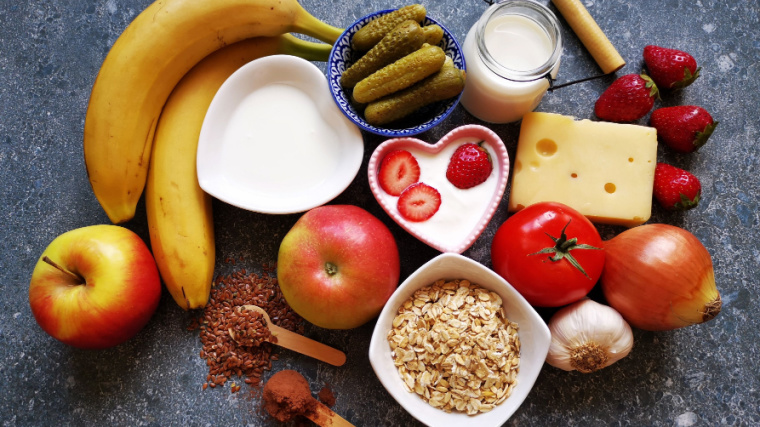Whether your main goal is to pack on muscle or pack more plates onto the bar, you’re likely cramming as much protein as you can into your diet. And while a high-protein diet is a generally safe approach, some gastrointestinal distress isn’t unheard of after all that whey protein powder in your shakes.
Many people take probiotic supplements to improve gut health. Though the idea is to reduce digestive side effects, sometimes certain strains of probiotics themselves may trigger more short-term side effects. Side effects of probiotics are more common in people with gastrointestinal medical conditions but can affect anyone. Here’s what you’ve got to know.

Editor’s Note: The content on BarBend is meant to be informative in nature, but it should not be taken as medical advice. When starting a new training regimen and/or diet, it is always a good idea to consult with a trusted medical professional. We are not a medical resource. The opinions and articles on this site are not intended for use as diagnosis, prevention, and/or treatment of health problems. They are not substitutes for consulting a qualified medical professional.
What Are Probiotics?
Understanding probiotics and why people take them starts with understanding bacteria in your gut and a few key terms. (1)
- Your gastrointestinal tract contains over 100 trillion microorganisms, which include bacteria, fungi, and viruses.
- A community of microorganisms, also called microbes, is called microbiota.
- The microbiome refers to all the microorganisms and microbiota. You can think of the microbiome as its own organ, which is key to your overall health.
The microbes in your gut can influence your health by affecting your metabolic and immune systems. You want a good diversity of gut bacteria and other microbes within your gut microbiome. More diversity leads to better gut health.
[Read More: The 10 Best Probiotic Supplements for Women]
Lower diversity of bacteria in the gut has been linked with inflammatory bowel disease (IBD), psoriasis, type 1 and type 2 diabetes, eczema, and Celiac disease. (1)
Your overall diet, certain medications, lifestyle habits, and certain medical conditions can harm your gut microbiota, taking away its diversity. That’s where probiotics come in. (1)
Benefits of Probiotics
Probiotic means “for life” in Greek. Ferdinand Vergin coined the term in 1954, calling probiotics good bacteria. In 1989, the definition became more specific: probiotics are microorganisms that offer health benefits to their host (in this case, humans). (2)
In 2002, the FAO (Food and Agriculture Organization of the United Nations) and the WHO (World Health Organization) settled on its current definition. They state that probiotics are “live strains of strictly selected microorganisms which, when administered in adequate amounts, confer a health benefit on the host.” (2)
There are also prebiotics and synbiotics — a combination of prebiotics and probiotics. All three are types of live bacteria you add to your gastrointestinal tract that can help grow good bacteria in your gut. Combining probiotics and prebiotics into synbiotics may help them survive better. (2)

[Read More: These Are the Best Prebiotic Foods for Gut Health and Gym Gains]
Research shows many health benefits of probiotics — after all, being “beneficial bacteria” is their definition. (2)
- Probiotics can help treat gastrointestinal health conditions, including IBS, inflammatory bowel disease, ulcerative colitis, and Crohn’s disease. (2)
- Probiotics influence your immunity and may help boost your immune system. (2)
- Certain strains of probiotics may help reduce antibiotic-associated diarrhea (AAD). Four meta-analyses found Saccharomyces boulardii and Lactobacillus rhamnosus GG most helpful in reducing AAD. (3)
- A systematic review found certain strains of probiotics could reduce lower gastrointestinal symptoms in people with IBS and prevent antibiotic-associated diarrhea. (4)
Sources of Probiotics
Most of the research-based health benefits of probiotics show they can help people with gastrointestinal medical conditions. They may still be helpful to people without these health conditions to improve their gut health, gut diversity, and immunity.
You can get probiotics from food sources or by taking probiotic supplements.
Probiotic Foods:
- Yogurt
- Kimchi, sauerkraut, and other fermented foods
- Kefir
- Kombucha
If you’re taking a probiotic supplement, it’s best to check with a healthcare provider first. Different probiotics are suitable for various health benefits.
[Read More: Why Probiotics Are Extra Beneficial for Athletes]
Here are the most common bacterial strains you’ll see in probiotic supplements. (1)(2)
- Bifidobacterium
- Lactobacillus
- Lactococcus
- Streptococcus
- Enterococcus
- Saccharomyces boulardii
- Acidophilus
What Are the Side Effects of Probiotics?
Certain probiotic products seem to trigger side effects more frequently in people with inflammatory bowel disease. Other people may experience gastrointestinal symptoms, headaches, and allergic reactions.
Gastrointestinal Symptoms
The most common side effects are gastrointestinal symptoms. A systematic review and meta-analysis examined gastrointestinal side effects in people with inflammatory bowel disease taking probiotics. The symptoms were bloating, constipation, gas, abdominal pain, nausea, and soft stools. The symptoms may be short-term and worse when you first start taking probiotics. (5)

[Read More: The 7 Best Probiotics for Men]
Another study states that bloating and flatulence are the most common side effects of probiotics and that they otherwise seem to be well-tolerated. (6)
Amines May Cause Headaches
Some probiotic products and foods contain biogenic amines. Amines are substances that can function as neurotransmitters. They’re frequently found in fermented foods, cheese, wine, and the bacterial strains Lactobacillus, Lactococcus, and Enterococcus. (7)(8)
Examples of amines include histamine, tyramine, and phenylethylamine. As a neurotransmitter, amines may increase blood flow from your central nervous system and trigger headaches. Amines may also be responsible for some gastrointestinal side effects and a change in taste. (5)
Histamine May Trigger Allergic Reactions
Histamine is one type of amine found in fermented foods and probiotic products. For some people, consuming amines may increase histamine in their digestive tracts too much. Their bodies may interpret them as allergens and trigger an allergic reaction. It may be similar to a food intolerance. Symptoms can include skin flushing, nausea, abdominal pain, and headaches. (9)(10)
[Read More: 9 Best Greens Powders of 2023, RDN-Approved]
An allergic reaction to probiotics could also occur if someone is allergic to lactose, soy, or gluten. Many probiotic products are considered dairy-based and contain lactose. For lactose-intolerant people, they may experience side effects of bloating, constipation, abdominal pain, or an allergic reaction. (11)
More Side Effects for People With Gastrointestinal Medical Conditions
The primary systematic review and meta-analysis on the side effects of probiotics was on people with inflammatory bowel diseases, including Crohn’s disease and ulcerative colitis. The research suggests that people with these medical conditions may be more susceptible to the side effects of probiotics. (5)
How Many Probiotics Should I Take?
It’s best to check with a healthcare provider for medical advice when taking a new dietary supplement, including a probiotic supplement.
Probiotic dosage comes in CFUs, which stands for colony-forming units. In the current research, there is no standard minimum amount of CFUs (or microorganisms) to take to get the health benefits of probiotics. Probiotic products should have at least several billion CFUs to be effective. Some consider higher numbers to be better, but more research is needed. (6)
[Read More: Study: A Healthier Gut Could Mean More Muscular Strength]
You can also include probiotic foods like yogurt, sauerkraut, kimchi, and fermented foods in your diet.
Are Probiotics Safe?
Probiotic products are dietary supplements, which do not need to be approved by the U.S. Food and Drug Administration (FDA) to be sold. Some, but not all, probiotic products have been labeled “generally regarded as safe” (GRAS) by the FDA. To be given the GRAS label, the product must be scientifically proven not to cause harm if used as intended. (2)(12)
Before choosing a probiotic supplement, check if the FDA has labeled it as GRAS.
A systematic review of the safety of probiotics states that evidence mostly shows probiotics are safe. However, there are cases where they may cause adverse effects like sepsis, gastrointestinal ischemia, and fungemia. These occurred in people with compromised immune systems, critically ill people in the intensive care unit, and other hospitalized and postoperative patients. (13)

[Read More: Here’s Everything Strength Athletes Need to Know About Digestive Enzymes]
Probiotics may also not be safe for infants. Probiotics have caused severe and fatal infections in critically ill and premature infants, and the FDA has warned healthcare providers about this. (14)
In some cases, probiotics may cause infections or antibiotic resistance in immunocompromised people. Some probiotic supplements may not list all the microorganisms and could contain harmful bacteria. (14)
Expect Some Side Effects
Good gut health is more than a trend in the supplement industry. It can influence your digestive, immune, and metabolic systems. One component of good gut health is having a diverse gut microbiome with many different strands of good bacteria. Taking probiotics — in food or supplements — can increase that diversity.
Probiotics may have a few side effects, mostly bloating, constipation, gas, and flatulence. They may also trigger headaches and allergic reactions. Side effects may be short-term and subside after you get used to them. They’re generally considered safe, but immunocompromised people may want to avoid them.
Frequently Asked Questions
Let’s wrap up with some of your most burning questions.
Do probiotics have side effects?
Probiotics may trigger gastrointestinal side effects like bloating, constipation, and gas. They may also cause headaches and allergic reactions. Critically ill people and infants may also experience infections associated with ingestion.
Are probiotics bad for you?
Probiotics seem to be safe for most people. They’re found in many food sources. If you are immunocompromised, it’s best to check with a healthcare provider.
Can you have too many probiotics?
Taking too many probiotics could stimulate the overgrowth of bacteria. It’s best to follow the recommended dosage or check with a doctor.
References
- Valdes A M, Walter J, Segal E, Spector T D. Role of the gut microbiota in nutrition and health BMJ 2018; 361 :k2179.
- Markowiak P, Śliżewska K. Effects of Probiotics, Prebiotics, and Synbiotics on Human Health. Nutrients. 2017 Sep 15;9(9):1021.
- Guarino A, Guandalini S, Lo Vecchio A. Probiotics for Prevention and Treatment of Diarrhea. J Clin Gastroenterol. 2015 Nov-Dec;49 Suppl 1:S37-45.
- Hungin APS, Mitchell CR, Whorwell P, Mulligan C, Cole O, Agréus L, Fracasso P, Lionis C, Mendive J, Philippart de Foy JM, Seifert B, Wensaas KA, Winchester C, de Wit N; European Society for Primary Care Gastroenterology. Systematic review: probiotics in the management of lower gastrointestinal symptoms – an updated evidence-based international consensus. Aliment Pharmacol Ther. 2018 Apr;47(8):1054-1070.
- Dore MP, Bibbò S, Fresi G, Bassotti G, Pes GM. Side Effects Associated with Probiotic Use in Adult Patients with Inflammatory Bowel Disease: A Systematic Review and Meta-Analysis of Randomized Controlled Trials. Nutrients. 2019 Dec 2;11(12):2913.
- Williams NT. Probiotics. Am J Health Syst Pharm. 2010 Mar 15;67(6):449-58.
- Alvarez, M. A., & Moreno-Arribas, M. V. (2014). The problem of biogenic amines in fermented foods and the use of potential biogenic amine-degrading microorganisms as a solution. Trends in Food Science & Technology, 39(2), 146-155.
- Broadley KJ, Akhtar Anwar M, Herbert AA, Fehler M, Jones EM, Davies WE, Kidd EJ, Ford WR. Effects of dietary amines on the gut and its vasculature. Br J Nutr. 2009 Jun;101(11):1645-52.
- Ortolani C, Pastorello EA. Food allergies and food intolerances. Best Pract Res Clin Gastroenterol. 2006;20(3):467-83.
- Nout, M. (2014). Food Technologies: Fermentation. Encyclopedia of Food Safety, 168-177.
- Mattila-Sandholm, T., Myllärinen, P., Crittenden, R., Mogensen, G., Fondén, R., & Saarela, M. (2002). Technological challenges for future probiotic foods. International Dairy Journal, 12(2-3), 173-182.
- Hoffmann DE, Fraser CM, Palumbo F, Ravel J, Rowthorn V, Schwartz J. Probiotics: achieving a better regulatory fit. Food Drug Law J. 2014;69(2):237-72, ii.
- Didari T, Solki S, Mozaffari S, Nikfar S, Abdollahi M. A systematic review of the safety of probiotics. Expert Opin Drug Saf. 2014 Feb;13(2):227-39.
- U.S. Department of Health and Human Services. Probiotics: What You Need To Know. National Center for Complementary and Integrative Health.
Featured Image: LightField Studios / Shutterstock